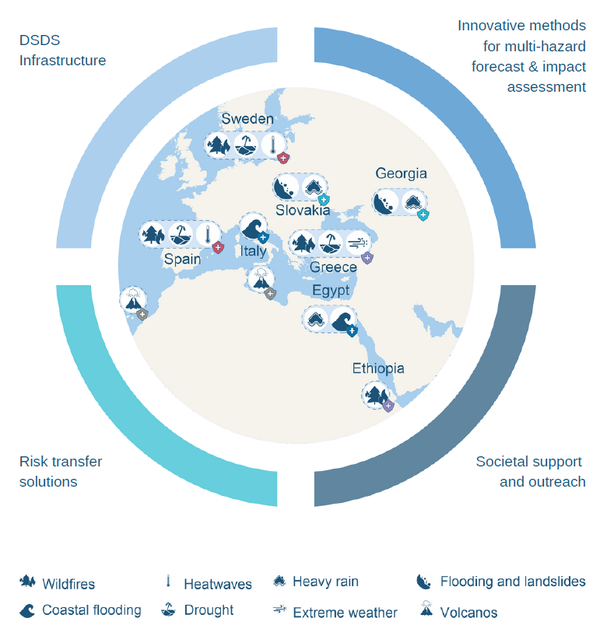12.07.2024 | Early warning system for Europe and the Mediterranean region to protect against natural disasters
JLU coordinates EU project for the early detection of extreme weather events
|
In order to better protect the Mediterranean region and Europe from natural disasters and extreme weather, the European Union is funding the development of an early warning system as part of a research project coordinated by Justus Liebig University Giessen (JLU). As part of the Horizon Europe project MedEWSa (Mediterranean and Pan-European Forecast and Early Warning System against Natural Hazards), JLU climatologist Dr. Elena Xoplaki and Prof. Dr. Jürg Luterbacher are researching the early detection of extreme weather, heat waves, droughts, floods, landslides and forest fires so that measures can be taken in good time. According to the European Commission's Copernicus Climate Change Service, June 2024 was the warmest June since records began and the 13th consecutive month with a monthly temperature record. Both last year and in 2024, intense and prolonged heatwaves, drought and large-scale forest fires caused considerable damage. In July 2023, local authorities issued a red heat warning in 16 Italian cities. Maximum temperatures of 49 degrees Celsius were measured on the islands of Sicily and Sardinia, a new record. There were also several major floods and local flash floods in 2023, for example in Greece, Libya, Bulgaria and Turkey. In June 2024, the devastating floods in Germany led to several deaths and considerable economic damage. |
|
|
These events show that European and African countries in the Mediterranean region are particularly exposed to natural hazards and extreme weather events. In order to improve resilience and mitigate the effects of such hazards, measures must be coordinated across regional borders. The MedEWSa project (2023-2026), which is funded by Horizon Europe with five million euros, is developing a networked early warning system for multiple natural hazards that supports first responders and facilitates informed decision-making. It thus contributes directly to the United Nations Sustainable Development Goals and strengthens the competitiveness and growth of the European Union. In 2022, the Secretary-General of the United Nations, António Guterres, initiated a global effort to protect all people on Earth from extreme weather events with early warning systems (EW4ALL) by the end of 2027. The MedEWSa project underlines the importance of research and multi-stakeholder collaboration in improving early warning systems in Europe and the Mediterranean region. It aims to promote collaboration, research, innovation and the dissemination of knowledge and technologies in support of EU policies to address global challenges. |
 |
|
The Horizon project aims to provide a networked early warning system covering the Mediterranean region and neighboring countries. It builds on existing regional and national infrastructures, fills gaps, uses innovative technologies (including artificial intelligence/machine learning) and develops new products and applications based on them. Particular attention will be paid to current and emerging hotspots for extreme events, vulnerable areas and communities at risk. MedEWSa focuses on a number of carefully selected pairs of pilot sites in Europe and Africa. The aim is to identify discrepancies, foster collaboration and demonstrate the transferability of the MedEWSa tools. MedEWSa is also developing innovative financial solutions by transferring risk to the capital markets. The project consortium coordinated by JLU and its Center for International Development and Environmental Research (ZEU) includes the World Meteorological Organization, ECWMF, research organizations, national meteorological services, local and national governments, companies, the Red Cross and many other institutions. |
|
